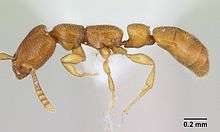Amblyoponinae
Amblyoponinae is a subfamily of ants in the poneromorph subfamilies group containing 13 extant genera and one extinct genus. The ants in this subfamily are mostly specialized subterranean predators.[2] Adult workers pierce the integument of their larvae to imbibe haemolymph, earning them the common name Dracula ant.[3]
| Amblyoponinae | |
|---|---|
 | |
| Apomyrma stygia | |
| Scientific classification | |
| Kingdom: | Animalia |
| Phylum: | Arthropoda |
| Class: | Insecta |
| Order: | Hymenoptera |
| Family: | Formicidae |
| Subfamily: | Amblyoponinae Forel, 1893 |
| Tribe: | Amblyoponini Forel, 1893 |
| Type genus | |
| Amblyopone Erichson, 1842 | |
| Genera | |
|
13 extant genera; 1 fossil genus[1] | |
Identification
Amblyoponinae is characterized by these worker characters: eyes small or absent, situated behind midlength of side of head; anterior margin of clypeus with specialized dentiform setae; promesonotal suture flexible; petiole very broadly attached to abdominal segment 3 and without a distinct posterior face; postpetiole absent; sting present and well developed.[2]
Systematics
The subfamily was formerly considered a tribe within Ponerinae, but was elevated to its own subfamily in 2003 when Barry Bolton divided Ponerinae into six subfamilies.[4]
- Amblyoponinae Forel, 1893
- Amblyoponini Forel, 1893
- Adetomyrma Ward, 1994
- Amblyopone Erichson, 1842
- Apomyrma Brown, Gotwald & Lévieux, 1971
- †Casaleia Pagliano & Scaramozzino, 1990
- Myopopone Roger, 1861
- Mystrium Roger, 1862
- Onychomyrmex Emery, 1895
- Opamyrma Yamane, Bui & Eguchi, 2008
- Prionopelta Mayr, 1866
- Stigmatomma Roger, 1859
- Xymmer Santschi, 1914
- incertae sedis
- Paraprionopelta Kusnezov, 1955
- Amblyoponini Forel, 1893
References
- Bolton, B. (2013), "An online catalog of the ants of the world.", AntCat, retrieved 22 September 2013
- "Subfamily: Amblyoponinae". antweb.org. AntWeb. Retrieved 12 August 2013.
- "Systematic Entomology". Tales of dracula ants: the evolutionary history of the ant subfamily Amblyoponinae (Hymenoptera: Formicidae).
- Fisher, Brian L.; Cover, Stefan P. (2007). Ants of North America: A Guide to the Genera. University of California Press. pp. 57–58. ISBN 978-0-520-93455-9.
